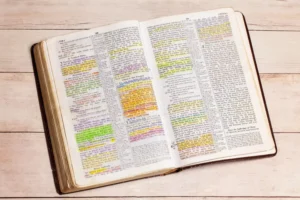When I was in second grade I got my mouth washed out with soap. I no longer remember what I said; I remember only the horrible taste of Ivory soap as the teacher rammed the bar into my mouth and then made me wash down the sudsy residue with water. I also remember being bewildered and humiliated, because I honestly didn’t know that what I’d said was considered bad.
In fifth grade I got busted again. I do remember what I said then — sorry, can’t repeat it here — but I swear I didn’t know it was considered a bad word. After all, everyone else used it. I just had the incredible bad luck of using it on a teacher. And I have to admit that when I was in the Marines, I occasionally — okay, more than occasionally — used language that would make a gangsta rapper blush.
I’ve often wondered about how we as a culture react to bad words. First, we must make a distinction between profanity, properly defined, and plain old vulgarisms or obscenities. The former is, literally, profaning God’s name, using it in vain. The latter are scatological or crude sexual terms that society deems out of bounds. Unfortunately, we tend to use the word profanity for all “bad” language, even when it technically isn’t profane. In fact, I’ve written before about confusion concerning what it means to profane God’s name.
All this comes to mind because of the popularity of the updated and revised Battlestar Galactica and the “dirty” word it has introduced to our culture: frak. (I didn’t realize, by the way, that the word was not coined for the new, darker, edgier Galactica; it was actually first used in the cheesy ’70s version of the series — you know, the one where everyone is supposedly from a very distant planet in the very distant past but they all wear bad disco haircuts and the evil cylons sport more chrome than a Buick Roadmaster. Who knew?)
We all know what frak sounds like, but it’s not really “the word, the big one, the queen-mother of dirty words,” as young Ralphie described it. We all know what they mean when they say it, but they’re not actually saying it. So does it count as a “dirty word”?
This brings to mind the comedian Lenny Bruce, who was arrested numerous times in the early ’60s on obscenity charges. (The late George Carlin cited Bruce as his inspiration for the act that made him famous: The Seven Dirty Words You Can’t Say on Television.) During one nightclub show, knowing that the police were ready to bust him, Bruce told a vulgar story full of euphemisms for excretory and sexual acts without actually using the words. The audience roared with laughter, and the police stood by helplessly. Bruce famously remarked, “This is the dirtiest show I’ve ever done, and they can’t touch me!”
And how many of you knew that when you use words like Gee, Jeez, Yeesh, or the like that you’re actually using a euphemism for Jesus’ name? Does that mean you’re being profane? (Our print magazines will not use these or similar words, by the way.) Dr. Dobson is famous for his use of Gadzooks, which is really a euphemism for “God’s hooks,” a British expression that in older days was a profane oath on the spikes used to nail Jesus to the cross. So is Dr. Dobson being profane?
In the end, I think, it comes down to intent. Do you know that what you’re saying is bad? Do you intend to say it? In second grade, I was purely innocent, even though I probably technically said a bad word. In fifth grade, I was sort of innocent, but I was also mouthing off at the teacher, so my heart was not in the right place. But Lenny Bruce was guilty, even though he technically did not say any obscene words.
So where does that leave Battlestar Galactica and frak? It’s an interesting question. I rarely if ever notice the f-word in a movie unless I’m assaulted by a fusillade of the vulgarism; after years in the Marines I’m inured to it. But I blanch when I hear Galactica’s version on TV. Why? I think the nudge-nudge, wink-wink nature of it is part of the problem. It’s a sly way of getting people to hear swearing even though they’re technically not swearing. It’s like Lenny Bruce, reveling in something while getting away with it. It’s the intent, not the word.
Thoughts?










